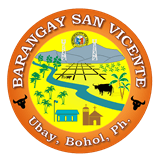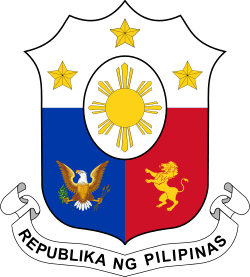San Vicente, Bohol
San Vicente is one of the 44 barangays of the municipality of Ubay, in the province of Bohol, Philippines.
San Vicente | |
|---|---|
 Seal | |
| Coordinates: 9°58′20″N 124°31′02″E | |
| Country | Philippines |
| Region | Central Visayas Region VII |
| Province | Bohol |
| District | 2nd District of Bohol |
| Municipality | Ubay |
| Urban District | VIII |
| Purok | 7 |
| Government | |
| • Type | Sangguniang Barangay |
| • Barangay Captain | Simeon Pesay |
| • Brgy Council | |
| Area | |
| • Total | 966 ha (2,387 acres) |
| Population (2015 census)[1] | |
| • Total | 1,056 |
| • Density | 110/km2 (280/sq mi) |
| • Voter (2013)[2] | 613 |
| Time zone | UTC+8 (PST) |
| ZIP code | 6315 |
| IDD : area code | +63 (0)38 |
| PSGC | 071246041 |
The barangay's total land area is 966 hectares (2,390 acres).[3] According to the 2015 census, it has a population of 1,056, making 110 inhabitants per square kilometre (280/sq mi).[1]
San Vicente celebrates its annual fiesta on 5 April in honor of their patron saint.
Location
Located in the southeastern part of the municipality, San Vicente is bounded to the north by Imelda, to the east by Cagting, to the south by Biabas, and to the west by Lomangog. San Vicente is 21 km (13 mi) from the town center, Poblacion
The barangay is situated 425 kilometres (260 mi) southeast of the approximate center of Philippines and 635 kilometres (390 mi) from Manila.
Government
There are seven puroks overseen by the elected kagawads.
Economy
People in the barangay are mostly farmers who live by planting rice, camote, cassava, banana, and other vegetables. Some till agricultural smallholdings. Some of the population also weave mats, and produce palm oil and coconut products.
References
- Census of Population (2015). "Region VII (Central Visayas)". Total Population by Province, City, Municipality and Barangay. PSA. Retrieved 20 June 2016.
- Project of Precincts for the 2013 Barangay Elections
- Saz, Efren B. (April 2007). "A Comprehensive Assessment of the Agricultural Extension System in the Philippines: Case Study of LGU Extension in Ubay, Bohol" (PDF). Philippine Institute for Development Studies. Retrieved March 14, 2015.

